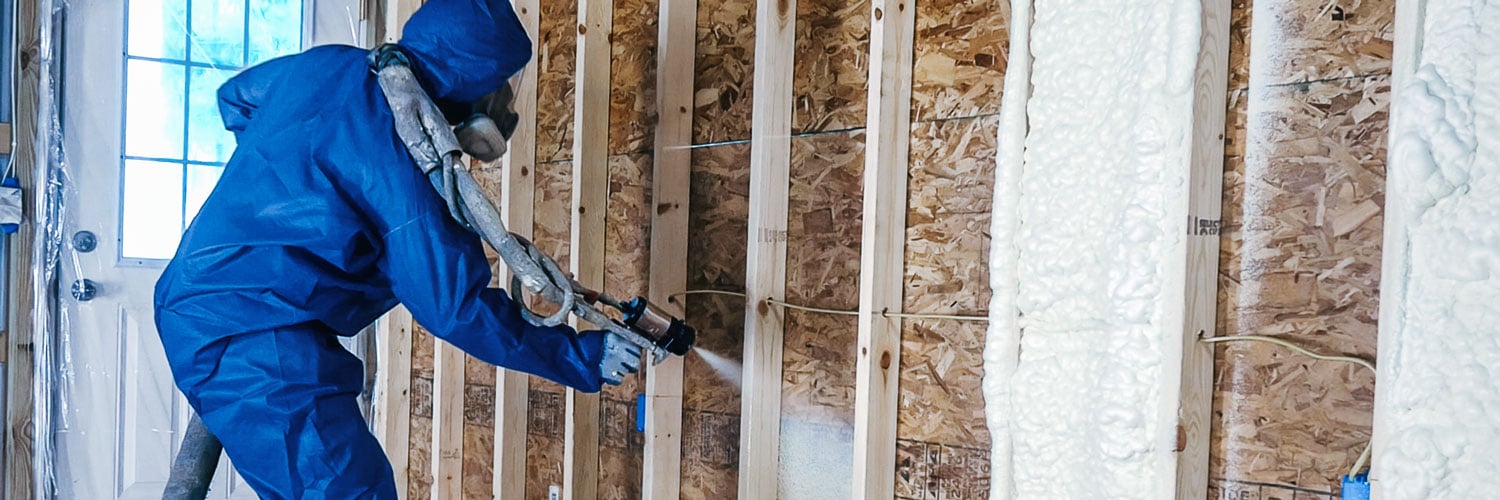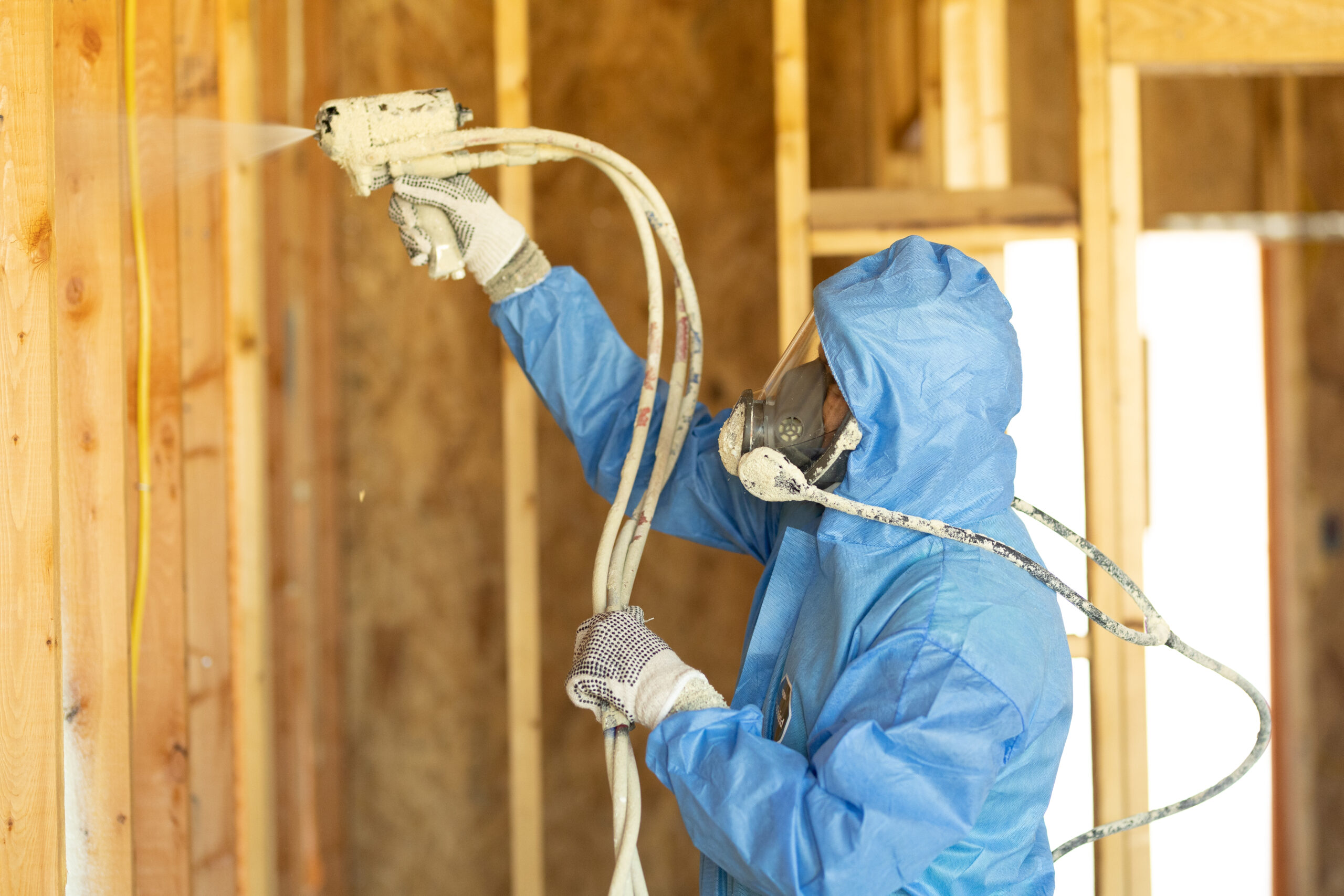How Spray Foam Can Boost Energy Efficiency in your house
How Spray Foam Can Boost Energy Efficiency in your house
Blog Article
Spray Foam: The Ultimate Service for Air Sealing and Insulation
Spray foam insulation has become a leading remedy for effective air securing and thermal insulation, supplying an one-of-a-kind combination of residential or commercial properties that establish it besides typical techniques. Its ability to expand and fill gaps makes it especially efficient in stopping air leakage, which can significantly affect power effectiveness. Recognizing the full extent of its benefits, installation processes, and comparisons with various other insulation kinds is important for making informed choices. As we explore these facets, the ramifications for both new constructions and retrofits become progressively considerable. What aspects should influence your option?
What Is Spray Foam?
Spray foam is a versatile insulation material that incorporates the concepts of air sealing and thermal resistance to enhance energy effectiveness in structures. Made up primarily of polyurethane or various other similar substances, spray foam is applied as a liquid that expands upon contact with surfaces, developing a strong, continual layer of insulation. This special property permits it to fill spaces, cracks, and voids that conventional insulation products may overlook, offering an exceptional air seal.
There are two primary sorts of spray foam: open-cell and closed-cell. Open-cell spray foam is lighter and a lot more flexible, providing exceptional sound absorption and a lower R-value per inch - Spray Foam. In comparison, closed-cell spray foam is denser, supplying a higher R-value, wetness resistance, and included architectural integrity to constructing components
The application process typically involves specialized devices, making sure a smooth application that abides by different substrates, consisting of metal, wood, and concrete. This versatility makes spray foam appropriate for both brand-new constructions and retrofitting existing structures. Its ability to produce an impermeable barrier dramatically contributes to lowering power intake and enhancing indoor air high quality, therefore making it a recommended option among property owners and building contractors alike.
Advantages of Spray Foam Insulation
Among the most substantial benefits of spray foam insulation is its remarkable capacity to develop a continual air barrier, which efficiently minimizes power loss. Unlike standard insulation products, spray foam increases to fill spaces and fractures, guaranteeing that air leakage is substantially decreased. This characteristic not only enhances energy effectiveness yet also leads to reduce energy bills with time.
Furthermore, spray foam insulation supplies exceptional thermal resistance, adding to a much more steady interior atmosphere. Its high R-value per inch allows for reliable insulation in constrained rooms, making it suitable for attics, wall surfaces, and crawl rooms. Furthermore, the moisture-resistant properties of spray foam aid protect against mold and mildew and mildew growth, advertising healthier living conditions.
Another essential advantage of spray foam insulation is its sound-dampening high qualities (Spray Foam). It efficiently decreases sound transmission in between rooms, developing a quieter and more comfy home environment. The longevity of spray foam additionally sticks out, as it does not droop or resolve in time, keeping its performance throughout its life-span
Exactly How Spray Foam Works
Comprehending just how spray foam insulation functions is crucial for valuing its effectiveness in air sealing and thermal resistance. Spray foam insulation includes two primary elements: isocyanate and polyol material. When these elements are blended, they undertake a chain reaction that causes the material to expand rapidly, creating a thick foam that loads cavities, spaces, and cracks.
As the foam increases, it adheres to surface areas, creating an airtight seal that substantially lowers air infiltration. This characteristic makes spray foam insulation extremely effective at preventing drafts and moisture infiltration, which can result in power loss and damages with time. Furthermore, the closed-cell variant of spray foam offers remarkable thermal resistance because of its stiff framework, efficiently minimizing warmth transfer.
The one-of-a-kind homes of spray foam enable it to comply with irregular surface areas, making sure extensive insurance coverage and a smooth obstacle. Therefore, spray foam insulation not just enhances power effectiveness but also adds to improved interior air high quality by decreasing the build-up of pollutants and irritants. Ultimately, understanding the auto mechanics behind spray foam emphasizes its duty as an exceptional selection for insulation and air sealing in both domestic and business applications.
Setup Refine Review

Before installation, the area has to be effectively cleaned and prepped, guaranteeing that surfaces are without dirt, moisture, and particles. Because contaminants can jeopardize attachment and general efficiency, this step is vital. When the area his response is prepared, the application includes mixing the two components of the spray foam, which increases upon call and loads voids properly.
Trained specialists need to perform the installation, utilizing specific equipment to ensure consistent insurance coverage and optimal thickness. Safety preventative measures, consisting of using safety gear and guaranteeing correct ventilation, are important during this procedure. After application, the foam generally remedies quickly, developing a strong barrier that enhances power effectiveness.
Contrasting Spray Foam to Conventional Insulation
When reviewing insulation options, spray foam insulation stands out in contrast to standard materials such as fiberglass and cellulose. One of the main benefits of spray foam is its exceptional air securing capabilities. Unlike fiberglass and cellulose, which can enable air seepage, spray foam increases upon application, loading gaps and spaces to create an airtight seal. This causes improved energy efficiency, as much less warmed or cooled air runs away the home, causing lower energy bills.
Additionally, spray foam gives a greater R-value per inch than typical insulation types, offering more effective thermal resistance in a thinner profile. This characteristic is especially useful in areas with restricted dental caries depth. Furthermore, spray foam is resistant to wetness and mold growth, which can be a substantial issue with cellulose and fiberglass, particularly in moist settings.
However, spray foam insulation generally lugs a greater ahead of time price than its typical counterparts. Property owners need to weigh this first investment versus lasting power savings and efficiency benefits. Inevitably, while both insulation kinds serve their purpose, spray foam emerges as an extra innovative option for modern insulation requirements, specifically in terms of air securing and thermal performance.

Conclusion
In summary, spray foam insulation represents an extremely efficient option for accomplishing ideal air securing and thermal resistance. Its unique residential or commercial properties, including dampness resistance and audio dampening, make it ideal for numerous applications in both new building and constructions and retrofitting jobs (Spray Foam). The Find Out More initial expenses might be higher contrasted to conventional insulation materials, the long-lasting benefits, such as significant power cost savings and enhanced indoor air high quality, warrant official statement the financial investment and underscore its value in contemporary structure methods.
Spray foam insulation has emerged as a leading solution for effective air sealing and thermal insulation, providing a special combination of homes that set it apart from standard approaches.Spray foam is a flexible insulation material that combines the concepts of air securing and thermal resistance to enhance energy performance in structures.When assessing insulation alternatives, spray foam insulation stands out in comparison to standard materials such as fiberglass and cellulose. Inevitably, while both insulation kinds serve their purpose, spray foam emerges as a much more innovative remedy for contemporary insulation requirements, particularly in terms of air securing and thermal effectiveness.
In summary, spray foam insulation represents an extremely efficient remedy for achieving optimum air securing and thermal resistance.
Report this page